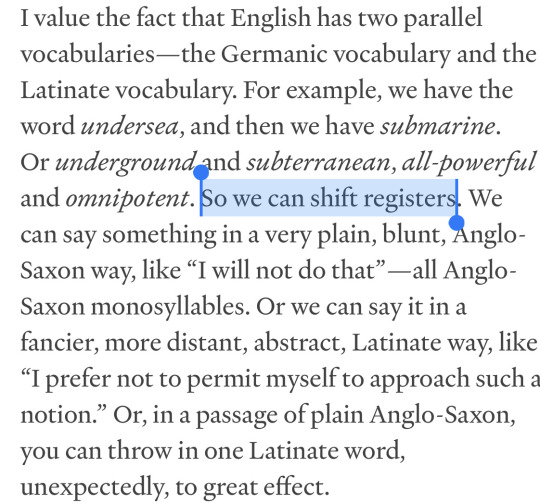American expat living in France | EFL teacher | M.A. in Applied Linguistics | Here for scraps of motivation and the aesthetic | English - Levantine Arabic - French
Don't wanna be here? Send us removal request.
Photo
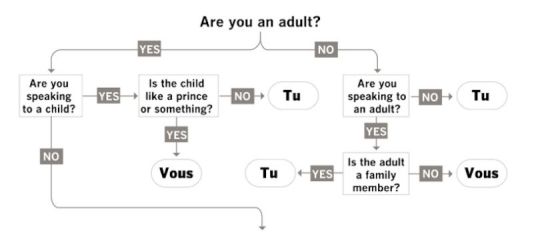
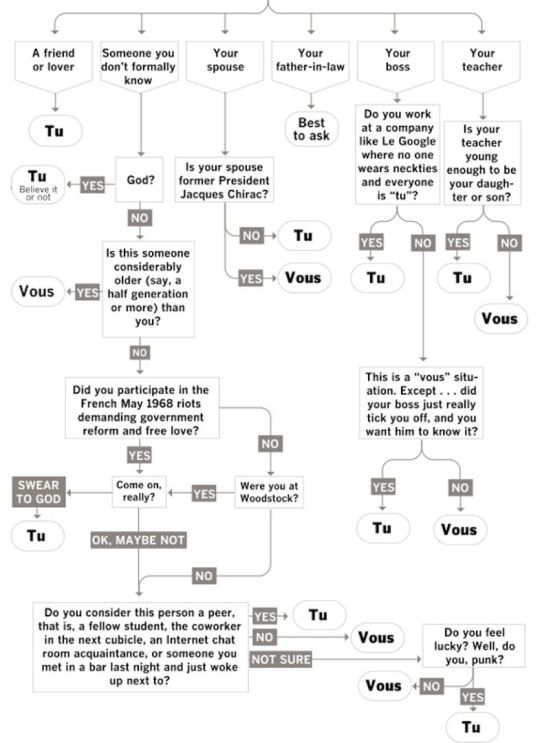
Vous vs. Tu, French “you”.
Chart from the LA Times.
22K notes
·
View notes
Text
“I met my wife at a Star Trek convention. She was study abroad from France and spoke little English, and I didn’t know a lick of French. So, for the first few months of our relationship, we communicated by speaking Klingon.”
—
Hear more tales of nerdery in this week’s Pwn Up! (via dorkly)
Okay I’m not even a Star Trek fan but that’s beautiful.
(via tchy)
153K notes
·
View notes
Note
j'adore le franglish content le code switching c'est tellement fun je sautille from a language to another like a gazelle et toi aussi tant que tu voudras :)
OUAIS baby we are so fucking back. franglais est parfait parce que americans get mad AND it sends evil psychic vibes à l’académie française. The phrase “qu’est-ce qu’y’all doing aujourd’hui” came out of my mouth this evening and i think that might be the pinnacle of human language. i love being annoying
28K notes
·
View notes
Text
something i have always found really weird is when english texts italicize words from other languages.
i remember reading a book as a kid and the author continually italicizing the word tamales
80K notes
·
View notes
Text




I posted a chatty video on my YouTube channel all about how I started reading in French, with some francophone book recommendations too! You can find it here 🇫🇷📚✨
2K notes
·
View notes
Text
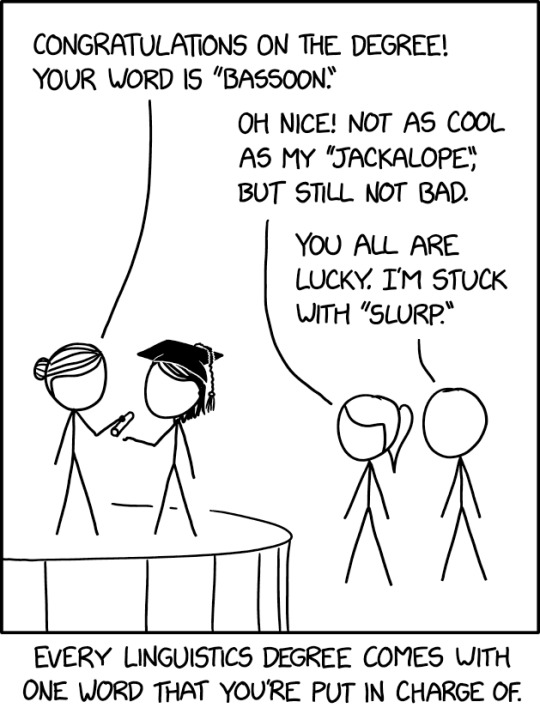
87K notes
·
View notes
Text
One of the first books I read in English as a kid, maybe 1 year after I started learning English, was a booklet with a title like, How to Have a Great Time at Summer Camp. I don’t remember the exact title and I know I only picked it up because the other books in English in my school’s library looked way beyond my level, stuff like Austen and Dickens. The summer camp booklet didn’t look too interesting but it was small with simple sentences. I ended up being fascinated with it because it was the most American thing I had ever got my hands on and it felt impossibly exotic
all the kids had cool American names like Jill and Mike. One of them at one point talked about the “chipmunks” in the woods near the camp, a mysterious word that didn’t exist in my tiny English dictionary, and for some reason I pictured them as scrawny wolves. I had read Little House on the Prairie so I knew wolves were a major concern for Americans
camp “counsellors” were often mentioned, and my pocket English dictionary only defined that word as “psychologue”. I thought it was weird how American summer camps had dozens of psychologists roaming the premises, one for every 5 to 10 kids. That felt like a lot of psychologists
I had no idea that the word “pet” could mean “favourite”. When the booklet said one kid might become “the camp counsellor’s pet”, my dictionary helpfully led me to believe it meant that a psychologist would pick one unfortunate kid to be his domestic animal for the summer. Slightly disturbing. I moved on
the kids slept in “bunks” and my stupid dictionary only defined this word as “couche”. Which is not wrong, but we would probably say couchette instead, or better yet lits superposés, and couche is also our word for diaper so you can see why I continued being deeply intrigued by every new detail I learnt in this booklet. American kids are excited about camp because they get to sleep in diapers
I had never encountered the word “baseball” before but managed to guess it was some kind of sport, but when the booklet mentioned the “baseball diamond” (in the context of a kid saying the baseball diamond was big) I of course assumed it was an actual diamond that you could win if you won a game of baseball at camp. For some reason I had a debate with a classmate over the plausibility of this. I say for some reason because I didn’t really question the diapers or the wolves or the psychologists with their human pets. A diamond though? Doubt. I just remember that we were queueing up for lunch and I was like “What do you think?” and my friend said hesitantly, “Maybe if it’s a small diamond?” and I insisted “No! The book says it’s big!”
among the basic items the book said every kid should bring to camp were “batteries”. I didn’t bother looking up that word in my dictionary seeing as it’s the same in French. I didn’t know it was a false friend, and I was impressed to learn that most American kids own a drum set and bring it to camp as an essential item
on the same page, in the list of things every kid should put in their suitcase for summer camp, another item was “comic books”. I wasn’t sure what those were since in French we call them BD, but basing myself on the word “comic” I assumed they were books of jokes and puns. I loved learning that in the US all kids bring humour anthologies to summer camp, presumably because they worry about running out of funny things to say. I thought American kids sounded nervous and sweet. But also really cool, because of all the drums
88K notes
·
View notes
Note
Can anyone help me with cute lovely arabic names or phrases to call my girlfriend ??
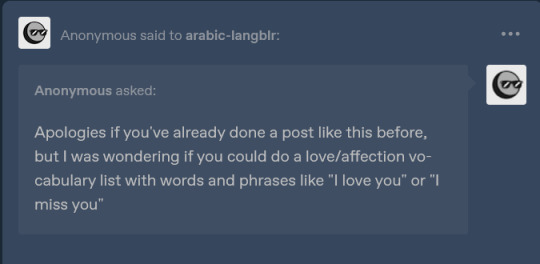
Hi anons!
I'll share some expressions in dialectal Arabic (Levantine), more specifically urban Palestinian dialect (my own dialect) since it's more informal and sounds more realistic in this particular setting. The below expressions are addressing a female (lmk if you'd like another list for addressing a male) :
Pet names :
حُبِّي ḥubbī (my love)
حَبيِبْتِي ḥabībtī (my beloved)
عُيَونِي ʿyounī (my eyes)
قَلْبِي ʾalbī (my heart)
عُمْرِي ʿumrī (my life : in the sense of the years of my life)
حَيَاتِي ḥayātī (my life : in the sense of the life I'm living)
يَا قَمَر yā ʾamar (i.e "you moon"; I know it sounds weird but you're telling her she's pretty. trust me)
Phrases
الوَقْتْ بِطير وأَنَا مَعِك el waʾt biṭīr w ana maʿek (time flies when I'm with you)
حَيَاتِي ما إِلْهَا مَعْنَى بِدُونِك ḥayātī ma elhā maʿnā bidōnek (my life has no meaning without you)
بَحِبَِّك baḥebbek (I love you)
إِنْتِ حِلْوَة entī ḥelweh (you're pretty)
ابْتِسَامْتِك بْتِسْحِرْنِي ebtisāmtek btesḥernī (your smile enchants me)
إِنْتِ أَغْلَى شِي بحَيَاتِي entī aġlā šī bḥayātī (you're the most precious thing in my life)
اشْتَقْتِلِّك (كتير) eštaʾtellek (ktīr) (I miss you -a lot-)
احْضُنِينِي eḥḍunīnī (embrace me)
إِنْتِ أَرْوَع حَدْ تْعَرَفْت عَليه entī arqaʿ ḥadd tʿarraft ʿalēh (you're the most amazing person I've ever met)
لا تِتْرُكِيني lā tetrukīnī (don't leave me)
قَرِبي عَليّ ʾarrbī ʿalayyī (come closer)
حَبِيتِك مَنْ أَوَّل نَظْرَة ḥabbētek min awwal naẓra (I fell in love with you at first sight)
I also made a vocab list (it's in MSA) about a similar topic here.
43 notes
·
View notes
Text

Mirror, mirror on the wall, who is the shiniest beetle of them all?
83 notes
·
View notes
Text
What does "C'est dans mes cordes ! " mean in French ?
être dans les cordes : lit. translation : to be in one's cords (as in vocal cords). Être dans les cordes : to be within one's capabilities
C'est dans mes cordes ! // It's something I can/know how to do ! C'est dans tes cordes ça, non ? // It's something you can/know how to do, right ? J'aimerais bien pouvoir t'aider , mais c'est pas vraiment dans mes cordes // I would love to help you out, but it's not really something I know how to do.
Origine de l'expression (Source : L'internaute) "Héritée du vocabulaire musical, l'expression "c'est dans mes cordes" signifie qu'un chanteur peut interpréter une mélodie, car elle convient aux capacités de ses cordes vocales. L'expression daterait du XIXe siècle. L'expression est désormais utilisée pour qualifier toute action réalisable." Translation : Inherited from musical vocabulary, the expression "c'est dans mes cordes" means that a singer can interpret a melody because it suits his vocal cords' capacities. The expression could date back to the 19th century. The expression is now used to describe any action that can be performed by someone.
53 notes
·
View notes
Text
Notes on French Verb Tenses
Present Tense, “Le présent”:
For (-er) verbs, drop ending (-er) and add (e, es, e, ons, ez, ent):
Je parle. - I speak. I am speaking.
Tu parles. - You speak. You are speaking.
Il parle. - He speaks. He is speaking.
Nous parlons. - We speak. We are speaking.
Vous parlez. - You (all) speak. You (all) are speaking.
Ils parlent. - They speak. They are speaking.
For (-ir) verbs, drop ending (-ir) and add (is, is, it, issons, issez, issent):
Je finis. - I finish. I am finishing.
Tu finis. - You finish. You are finishing.
Il finit. - He finishes. He is finishing.
Nous finissons. - We finish. We are finishing.
Vous finissez. - You (all) finish. You (all) are finishing.
Ils finissent. - They finish. They are finishing.
For (-re) verbs, drop ending (-re) and add (s, s, “, ons, ez, ent):
Je perds. - I lose. I am losing.
Tu perds. - You lose. You are losing.
Il perd. - He loses. He is losing.
Nous perdons. - We lose. We are losing.
Vous perdez. - You (all) lose. You (all) are losing.
Ils perdent. - They lose. They are losing.
Compound Past, “Le passé composé”:
Present tense of “avoir/être” + past participle of verb = I have ___. or I ___ed.
(avoir + __) (Past participle must agree with its direct object):
J'ai aimé. - I liked. I have liked.
Tu as aimé. - You liked. You have liked.
Il a aimé. - He liked. He has liked.
Nous avons aimé. - We liked. We have liked.
Vous avez aimé. - You (all) liked. You (all) have liked.
Ils ont aimé. - They liked. They have liked.
(être + __) (Past participle must agree with the subject):
Je suis devenu(e). - I became. I have become.
Tu es devenu(e). - You became. - You have become.
Il est devenu. - He became. He has become.
Nous sommes devenu(e)s. - We became. We have become.
Vous êtes devenu(e)(s). - You (all) became. You (all) have become.
Ils sont devenus. - They became. They have become.
Imperfect, “L’imparfait”:
Infinitive form of “nous” verb, remove (-ons), add (ais, ais, ait, ions, iez, aient):
Je parlais. - I spoke. I was speaking.
Tu parlais. - You spoke. You were speaking.
Il parlait. - He spoke. He was speaking.
Nous parlions. - We spoke. We were speaking.
Vous parliez. - You (all) spoke. You (all) were speaking.
Ils parlaient. - They spoke. They were speaking.
Near Future, “Le futur proche”:
Present tense of “aller” + infinitive of action verb = I am going to ___.
Je vais voir Luc. - I am going to see Luc.
Il va arriver. - He is going to arrive.
Nous allons manger. - We are going to eat.
Simple Future, “Le futur simple”:
For (-er, -ir) verbs, infinitive + (ai, as, a, ons, ez, ont) = I will ___.
Je parlerai. - I will speak.
Tu parleras. - You will speak.
Il parlera. - He will speak.
Nous parlerons. - We will speak.
Vous parlerez. - You (all) will speak.
Ils parleront. - They will speak.
For (-re) verbs, drop (-e) from infinitive + (ai, as, a, ons, ez, ont):
Je vendrai. - I will sell.
Tu vendras. - You will sell.
Il vendra. - He will sell.
Nous vendrons. - We will sell.
Vous vendrez. - You (all) will sell.
Ils vendront. - They will sell.
Past Perfect, Pluperfect, “Le plus-que-parfait”:
Imperfect of auxilary verb (avoir/etre) + past participle of verb = I had ___ed.
(avoir + __) (Past participle must agree with its direct object):
J’avais aimé. - I had liked.
Tu avais aimé. - You had liked.
Il avait aimé. - He had liked.
Nous avions aimé. - We had liked.
Vous aviez aimé. - You (all) had liked.
Ils avaient aimé. - They had liked.
(être + __) (Past participle must agree with the subject):
J’étais devenu(e). - I had become.
Tu étais devenu(e). - You had become.
Il était devenu. - He had become.
Nous étions devenu(e)s. - We had become.
Vous étiez devenu(e)(s). - You (all) had become.
Ils étaient devenus. - They had become.
Conditional, “Le conditionnel”:
For (-er, -ir) verbs, infinitive + ais, ais, ait, ions, iez, -aient) = I would ___.
Je parlerais. - I would speak.
Tu parlerais. - You would speak.
Il parlerait. - He would speak.
Nous parlerions. - We would speak.
Vous parleriez. - You (all) would speak.
Ils parleraient. - They would speak.
For (-re) verbs, drop (-re) from infinitive + (ais, ais, ait, ions, iez, -aient):
Je vendrais. - I would sell.
Tu vendrais. - You would sell.
Il vendrait. - He would sell.
Nous vendrions. - We would sell.
Vous vendriez. - You (all) would sell.
Ils vendraient. - They would sell.
Past Conditional, “Le conditionnel passé”:
Conditional of “avoir/être” + past participle of verb = I would have ___ed.
(conditional avoir + __) (Past participle must agree with its direct object):
J’aurais aimé. - I would have liked.
Tu aurais aimé. - You would have liked.
Il aurait aimé. - He would have liked.
Nous aurions aimé. - We would have liked.
Vous auriez aimé. - You (all) would have liked.
Ils auraient aimé. - They would have liked.
(conditional être + __) (Past participle must agree with the subject):
Je serais devenu(e). - I would have become.
Tu serais devenu(e). - You would have become.
Il serait devenu. - He would have become.
Nous serions devenu(e)s. - We would have become.
Vous seriez devenu(e)(s). - You (all) would have become.
Ils seraient devenus. - They would have become.
(Important missing tenses from post this include the subjunctive and imperative, the simple past tense, the French passive voice, forming gerunds, et cetera.)
2K notes
·
View notes
Text
ive developed a new studying technique called not doing it
13K notes
·
View notes
Text
Studying linguistics is actually so wonderful because when you explain youth slang to older professors, instead of complaining about how "your generation can't speak right/ you're butchering the language" they light up and go “really? That’s so wonderful! What an innovative construction! Isn't language wonderful?"
29K notes
·
View notes
Text
So I've been learning French for a while and 'faire' is actually an incredible word. Like what a fucking breakthrough in economy of language.
Faire is a verb that is usually translated into English as "to do/to make," but it covers way more actions than that, which is very confusing for new speakers. because (I have realized) that's not really what faire means.
Faire is actually a word that just gestures vaguely in the direction of the object of the sentence and goes "you know." "Je fais du velo." "Je fais du courses." "Je fais mes valises." I'm biking. I go grocery shopping. I'm packing my bags. You're just sort of pointing at a bike and going "you know, the obvious thing you'd do with it."
English: "You mean RIDE it??"
French: "Sure whatever."
Like idk I just really enjoy the concept of a catch-all verb that you can just slap onto almost anything because who fucking gives a shit, you get the idea. There's a bike. what do you think I'm going to do with it.
19K notes
·
View notes
